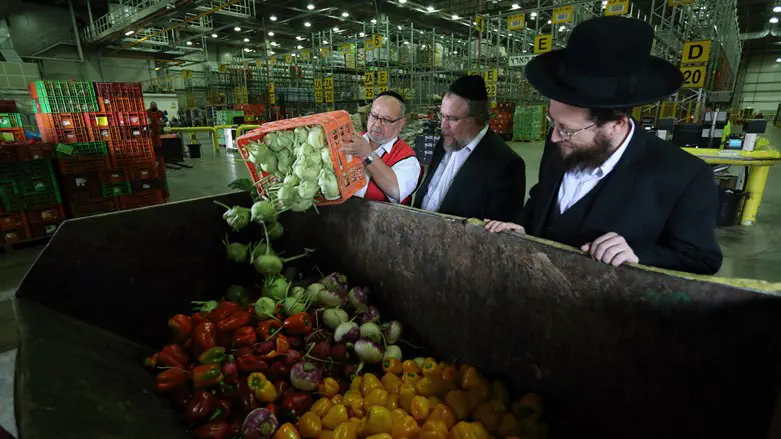
Following a request for freedom of information submitted by the "Kosharot" organization, the Chief Rabbinate's response to a petition by the Tzohar rabbinical organization in the Supreme Court has been published, in which the Chief Rabbinate describes in detail the deficiencies it claims to have discovered in the Tzohar organization's kashrut body.
The petition was filed by Tzohar Food Inspection Ltd. after the Chief Rabbinate refused to recognize Tzohar as a body authorized to give kosher status to products imported from abroad, as the Chief Rabbinate allows for a number of other private kahsrut bodies.
The Chief Rabbinate replied to the petition that it was determined not to recognize Tzohar for the purpose of kosher food products imported into Israel, and pointed to a long list of deficiencies it claimed to have discovered in Tzohar's kashrut body during its years of operation.
"The Chief Rabbinate cannot rely on the petitioner (Tzohar) as a body whose kashrut services are reliable," the Chief Rabbinate replied to the Supreme Court. "According to findings provided by the inspectors of the unit for the prevention of kashrut fraud, a problematic picture emerged regarding the conduct of the kashrut body in the provision of supervision services in Israel, following material failures found in the conduct of the petitioner's supervision."
For example, "The petitioner gave retroactive kashrut status to a winery for wine produced seven years before the certificate was issued, based on testimony from the owners of the place, and even after a video was published showing that in the wine bottle process non-Torah observant people worked in the factory, which is forbidden. it did not remove the kashrut certification."
"In another case, the petitioner gave kashrut certification to a bakery which was inside a non-kosher restaurant, when in practice, after the rabbinical officials entered the place, it was found that there were significant failures in providing care services to the bakery, which led to misleading the kashrut-keeping public," it said.
"In another case, the Chief Rabbinate removed kashrut certification from a hotel after significant failures in the conduct of the kashrut supervisor in matters of Shabbat and meat and milk. The petitioner gave its kashrut certification to the place without the kashrut supervisor being replaced," the chief rabbinate said.
"In some cases, the petitioner issued business supervision certificates immediately after the certification was removed by the Rabbinate over violation of kashrut laws. This, ostensibly, is contrary to the petitioner's own publications, in which its states that it will make sure to wait three months after the removal of kosher by the competent rabbinate before supervision is given on her behalf.
Therefore, the Chief Rabbinate argued, "Not only does the petitioner's kashrut body not comply with the Chief Rabbinate's kashrut procedures, but the petitioner also conducts itself in an irresponsible manner, which does not allow the rabbinate, in its position, to trust it for recognition."
In the Chief Rabbinate of Israel's response to the Supreme Court, allegations were also made against Rabbi Oren Duvdevani, who heads Tzohar's kashrut body. "Rabbi Duvdevani, who serves as the rabbi's authority and as the petitioner's kashrut expert, is not recognized by the rabbinate as a renowned authority in the field. This is due, among other things, to substantial halakhic disagreements that go as far as contradictions in relation to the halakhic positions of the chief rabbinate. These include halakhic opinions that were expressed in the publication of articles whose content is inconsistent with the positions of most authorities and kashrut experts."
However, it was stated that "Rabbi Duvdevani's halakhic position in itself is legitimate - but the Chief Rabbinate cannot accept a situation where a kashrut organization that serves as the 'long arm' overseas, and operates under its approval - will hold a position contrary to the rabbinical halakhic view of giving. kashrut certification according to its opinions."
Kosharot stated that the failures the Chief Rabbinate claimed to have found in the Tzohar body demonstrate the danger of the proposed kashrut reforms of Religious Affairs Minister Matan Kahana.
"The 'three rabbis' outline will blow up in our faces," Kosharot stated. "Unfortunately, those who wanted to fix the kashrut system with good intentions do not take responsibility in the face of factual data from the fraud department. No one is free from criticism, and when there are failures, they must be acknowledged and corrected. If the project did not meet the rules and goals defined by the Tzohar rabbis - the project must be closed and the masses must not be led astray."
"We emphasize again - only one kashrut. under a transparent and professional governmental organization with uniform protocols, can bring about the mending of the kashrut system," Kosharot said.
The Tzohar kashrut body stated in response: "The rabbinate's incitement against Tzohar's kashrut body is an attempt to produce a battle on the back of Tzohar following the reforms. The rabbinate tried to get the petition dismissed by raising allegations that were not true. This attempt failed and the Supreme Court ruled that the petition would be heard by the panel."
"The response on behalf of the rabbinate includes slander and attacks the reputation of a rabbi in Israel. It goes hand in hand with failure in the field of 'offenses between a person and his fellow.' It is these behaviors that have led to public disgust towards the rabbinate's kashrut. Our response is accompanied by our response to the Supreme Court, which includes a response to each and every one of the unfounded allegations that appear in the rabbinate's response," Tzohar said.
